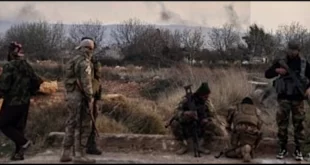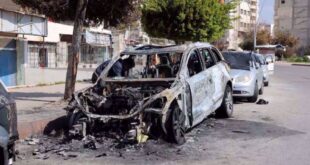The following article, by Tom Duggan, is republished from Global Research:
The Syrian Government is trying to keep medicine at an affordable price for the consumer by limiting the price of medicines, but the pharmaceutical industry inside Syria needs to raise the prices to sustain production.
This is due to two main factors: Sanctions and economy.
Some factories are closing and some are reducing work force.
It’s extremely difficult to purchase the ingredients to make basic medicines through sanctions and also through the exchange rate dollar and the Syrian pound.
Most Syrians earn the same salary they did prior to the beginning of the war 12 years ago but the cost of living has become unbearable for the average family, because the price of manufacturing has increased, and the pharmaceutical companies need to pass on to the consumer, and here is the rub, the consumer can’t afford the increase on its present salary.
The Syrian Government is conducting negotiations with the manufactures at this moment to reach some kind of compromise.
Sanctions
The United States first introduced sanctions at the end of April 2011 against five key persons and entities in the Syrian Government. This measure was followed shortly afterwards by similar sanctions imposed by the European Union. The US sanctions were significantly extended on 18 August 2011 and the list of sanctioned parties has grown. The EU followed on 3 September 2011 by targeting the supply, transport, financing and insurance of Syrian oil and petroleum products.
That was the beginning closely followed by EU sanctions against persons & entities 2013 sanctions can be increased at any time without notice:
- embargo on telecommunications monitoring and interception equipment
- ban on provision of certain services (related to such equipment)
- import ban on crude oil and petroleum products
- ban on provision of certain services (related to crude oil and petroleum products)
- embargo on key equipment and technology for the oil and natural gas industries
- ban on provision of certain services (to the oil and natural gas industries) – ban on provision of new Syrian banknotes and coins
- ban on trade in gold, precious metals and diamonds with the Government of Syria
- embargo on luxury goods
- ban on certain investment (in the oil and natural gas industries, in construction of power plants for electricity production)
- prohibition to participate in the construction of new power plants for electricity production
- restraint on commitments for public and private financial support for trade with Syria and ban on new long term commitments of Member States
- ban on new commitments for grants, financial assistance and concessional loans to the Government of Syria
- prohibition for the European Investment Bank to make certain payments
- restrictions on issuance of and trade in certain bonds
- restrictions on establishment of branches and subsidiaries of and cooperation with Syrian banks
- restrictions on provision of insurance and re-insurance – restrictions on access to airports in the EU for certain flights
- inspection of certain cargoes to Syria and prior information requirement on cargoes to Syria
- restrictions on admission of certain persons
- freezing of funds and economic resources of certain persons, entities and bodies
- prohibition to satisfy claims made by certain persons, entities or bodies – valid until 1.6.2017
And each year it gets worse.
With the fake gas attacks an increase in sanctions came into force, this was partially due to the report on Douma by the OPCW which left out valuable information it was not until 2020 when whistle blowers revealed the truth ,but still strict sanctions on Syria were imposed.
Equipment Laboratory equipment, including parts and accessories for such equipment, (destructive or non-destructive) analysis or detection of chemical substances,
This part read carefully,
with the exception of equipment, including parts or accessories, specifically designed for medical use, universities inside Syria cannot purchase test tubes or basic lab equipment due to sanctions.
Trump is also going to extend more measures through the Caesar Act.
ANNEX
A list of Banned Chemicals
A list of Banned Chemicals:
Separate chemically defined compounds according to Note 1 to Chapters 28 and 29 of the Combined Nomenclature (1), at 90 % concentration or greater, unless otherwise indicated, as follows: Acetone, (CAS RN 67-64-1) (CN code 2914 11 00) Acetylene, (CAS RN 74-86-2) (CN code 2901 29 00) Ammonia, (CAS RN 7664-41-7) (CN code 2814 10 00) Antimony, (CAS RN 7440-36-0) (heading 8110) Benzaldehyde, (CAS RN 100-52-7) (CN code 2912 21 00) Benzoin, (CAS RN 119-53-9) (CN code 2914 40 90) 1-Butanol, (CAS RN 71-36-3) (CN code 2905 13 00) 2-Butanol, (CAS RN 78-92-2) (CN code 2905 14 90) Iso-Butanol, (CAS RN 78-83-1) (CN code 2905 14 90) Tert-Butanol, (CAS RN 75-65-0) (CN code 2905 14 10) Calcium carbide, (CAS RN 75-20-7) (CN code 2849 10 00) Carbon monoxide, (CAS RN 630-08-0) (CN code 2811 29 90) Chlorine, (CAS RN 7782-50-5) (CN code 2801 10 00) Cyclohexanol, (CAS RN 108-93-0) (CN code 2906 12 00) Dicyclohexylamine (DCA), (CAS RN 101-83-7) (CN code 2921 30 99) Ethanol, (CAS RN 64-17-5) (CN code 2207 10 00) Ethylene, (CAS RN 74-85-1) (CN code 2901 21 00) Ethylene oxide, (CAS RN 75-21-8) (CN code 2910 10 00) Fluoroapatite, (CAS RN 1306-05-4) (CN code 2835 39 00) Hydrogen chloride, (CAS RN 7647-01-0) (CN code 2806 10 00) Hydrogen sulfide, (CAS RN 7783-06-4) (CN code 2811 19 80) Isopropanol, 95 % concentration or greater, (CAS RN 67-63-0) (CN code 2905 12 00) Mandelic acid, (CAS RN 90-64-2) (CN code 2918 19 98) Methanol, (CAS RN 67-56-1) (CN code 2905 11 00) Methyl chloride, (CAS RN 74-87-3) (CN code 2903 11 00) 23.7.2013 Official Journal of the European Union L 198/33 EN ( 1) As set out in the Commission Implementing Regulation (EU) No 927/2012 of 9 October 2012 amending Annex I to Council Regulation (EEC) No 2658/87 on the tariff and statistical nomenclature and on the Common Customs Tariff (OJ L 304, 31.10.2012, p. 1). Methyl iodide, (CAS RN 74-88-4) (CN code 2903 39 90) Methyl mercaptan, (CAS RN 74-93-1) (CN code 2930 90 99) Monoethyleneglycol, (CAS RN 107-21-1) (CN code 2905 31 00) Oxalyl chloride, (CAS RN 79-37-8) (CN code 2917 19 90) Potassium sulphide, (CAS RN 1312-73-8) (CN code 2830 90 85) Potassium thiocyanate (KSCN), (CAS RN 333-20-0) (CN code 2842 90 80) Sodium hypochlorite, (CAS RN 7681-52-9) (CN code 2828 90 00) Sulphur, (CAS RN 7704-34-9) (CN code 2802 00 00) Sulphur dioxide, (CAS RN 7446-09-5) (CN code 2811 29 05) Sulphur trioxide, (CAS RN 7446-11-9) (CN code 2811 29 10) Thiophosphoryl chloride, (CAS RN 3982-91-0) (CN code 2853 00 90) Tri-isobutyl phosphite, (CAS RN 1606-96-8) (CN code 2920 90 85) White/yellow phosphorus, (CAS RN 12185-10-3, 7723-14-0) (CN code 2804 70 00) ANNEX II Entry referred to in point (11)(c) IX.A2.010.
 Syria Support Movement solidarity with the Syrian people
Syria Support Movement solidarity with the Syrian people




